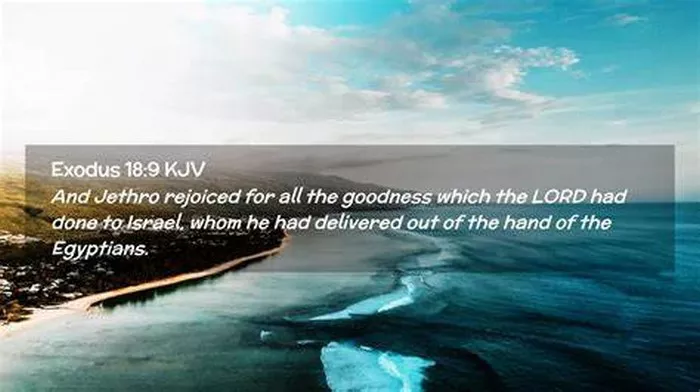Read the Daily Bible Verse – Exodus 18:9 To Strengthen Your Spiritual Journey.
Exodus 18:9 is a pivotal verse in the story of Moses and his father-in-law, Jethro. It illustrates the joy and acknowledgment of God’s divine intervention in the lives of His people. This article delves into the context, meaning, and practical application of Exodus 18:9 while comparing it to other biblical texts, exploring its modern-day relevance, and examining scholarly commentary.
The Context on Exodus 18:9 KJV
Exodus 18:9 (KJV) states:”And Jethro rejoiced for all the goodness which the Lord had done to Israel, whom he had delivered out of the hand of the Egyptians.”
This verse is part of the larger narrative in Exodus 18, where Jethro visits Moses in the wilderness after hearing about the extraordinary acts God performed for Israel. Jethro, a Midianite priest, brings Moses’ wife, Zipporah, and his two sons to reunite with him. During their meeting, Moses recounts the miraculous deliverance of the Israelites from Egypt, including the plagues, the crossing of the Red Sea, and the provision of manna.
Jethro’s response in Exodus 18:9 signifies a heartfelt recognition of God’s power and faithfulness. His reaction not only reflects personal joy but also serves as an acknowledgment of God’s sovereignty over all nations.
The Exodus 18:9 Meaning
Acknowledgment of God’s Goodness
Jethro’s joy centers on “all the goodness which the Lord had done to Israel.” This refers to the blessings and miracles God provided during the Israelites’ exodus, such as their liberation from slavery, protection from Pharaoh’s army, and sustenance in the wilderness. Jethro’s reaction demonstrates an external validation of God’s work, as he was not directly involved in the events but could still perceive their significance.
Recognition of Divine Deliverance
The phrase “delivered out of the hand of the Egyptians” highlights God’s role as the ultimate deliverer. This deliverance was not merely physical but also spiritual, showcasing God’s covenantal faithfulness to His people. Jethro, though a Midianite priest, acknowledges the uniqueness and supremacy of the God of Israel.
Unity in Worship
Jethro’s rejoicing reflects a unifying theme in Scripture: the shared joy in God’s deeds transcending ethnic and national boundaries. His response shows that God’s works can inspire faith and gratitude in those outside the immediate covenant community.
Exodus 18:9 Application in Life
Exodus 18:9 offers practical lessons that can be applied in the lives of believers today:
Celebrating God’s Goodness
Jethro’s joy reminds Christians to pause and celebrate God’s goodness in their lives and the lives of others. Testimonies of deliverance and provision are opportunities to praise God and strengthen faith.
Sharing Testimonies
Moses’ recounting of God’s works to Jethro underscores the importance of sharing testimonies. Believers are encouraged to declare what God has done, as it can lead others to rejoice and glorify Him.
Acknowledging God’s Sovereignty
Jethro’s reaction teaches humility and the importance of recognizing God’s hand in every situation. Believers should cultivate an attitude of gratitude, acknowledging that every blessing is a testament to God’s grace.
Comparison with Other Biblical Texts
Exodus 18:9 resonates with themes found throughout Scripture:
Psalm 126:3 – Joy in God’s Work
This verse states, “The Lord hath done great things for us; whereof we are glad.” Like Jethro’s response, it reflects a communal joy in recognizing God’s blessings.
Luke 15:7 – Joy in Heaven
Jesus teaches that there is rejoicing in heaven over one sinner who repents. This parallels Jethro’s joy over God’s deliverance of Israel, as both reflect celebration in response to God’s intervention.
Romans 12:15 – Rejoicing with Others
Paul writes, “Rejoice with them that do rejoice.” Jethro embodies this principle by rejoicing over God’s goodness to Israel, even though he was not an Israelite himself.
Modern-Day Relevance
The lessons from Exodus 18:9 remain relevant in contemporary life:
Finding Joy in Others’ Victories
In a world often marked by competition and comparison, Jethro’s response encourages believers to genuinely celebrate others’ successes and blessings, recognizing them as evidence of God’s work.
Interfaith Dialogue and Witness
Jethro, a Midianite priest, rejoiced in the God of Israel’s deeds. This demonstrates that sharing testimonies of God’s work can resonate across cultural and religious boundaries, fostering mutual respect and understanding.
Gratitude in Leadership
For leaders, Jethro’s example serves as a reminder to remain thankful and joyful for the blessings and progress seen in their communities. Gratitude fuels resilience and fosters a culture of acknowledgment.
Conclusion
Exodus 18:9 is a profound verse that illustrates the joy and recognition of God’s goodness in delivering His people. Jethro’s rejoicing not only affirms God’s power and faithfulness but also provides timeless lessons on gratitude, the importance of sharing testimonies, and the unity that comes from celebrating God’s works.
In today’s context, this verse challenges believers to cultivate a spirit of gratitude and joy, to share their faith with others, and to celebrate the blessings and victories in the lives of those around them. By reflecting on and applying the truths of Exodus 18:9, Christians can deepen their faith and inspire others to recognize the goodness of God.
Exodus 18:9 Commentary
Biblical scholars provide rich insights into this verse:
Matthew Henry’s Commentary
Henry notes that Jethro’s joy was genuine and rooted in his recognition of God’s goodness. He emphasizes the importance of rejoicing in others’ spiritual blessings and victories, highlighting that such responses honor God.
Adam Clarke’s Commentary
Clarke points out that Jethro’s reaction was not only personal but also an act of worship. He highlights that Jethro’s rejoicing symbolizes an acknowledgment of God’s universal sovereignty.
The Pulpit Commentary
This commentary reflects on Jethro’s role as an outsider who sees and celebrates God’s works. It underscores the universal appeal of God’s power and the ability of His deeds to inspire awe across cultural and religious lines.
Related Topics:


